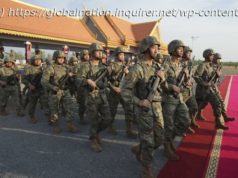The goal of the Turkestan Islamic Party is to punish China for what has been happening in Xinjiang, and it will do so wherever it can
The threat of returnees from Syria and Iraq is the threat that has not yet barked in the way that was expected.
While thousands of radicalised individuals from around the world streamed to fight in Syria, we have not yet seen the same outflow of individuals off the battlefield with direction to launch attacks back in their home countries. There have been some incidents, but it is still unclear whether this threat will express itself in the same way as the flow the other way.
When it does, however, China is one of the countries that should be particularly concerned by what happens to this flow.
In research undertaken in 2015, prominent terrorism researcher Thomas Hegghammer showed how terrorist plots featuring returnee foreign fighters were among the most lethal. Using a data set focused mostly on foreign fighters from the West, the research highlighted how individuals who had received some form of training or experience on the battlefield, tended to be more able to launch effective terrorist plots back home.
China’s security chief calls for greater use of AI to predict terrorism, social unrest
There is a logic to this: those who are experienced on the field are more likely to have training to make bombs or use other weapons (and therefore be more effective), they will be more desensitised to violence and therefore more willing to kill, and they are more likely to have the necessary contacts with terrorist networks and leadership.
But at the same time, being a foreign fighter does not necessarily equate to becoming a terrorist at home. Many foreign fighters are motivated by idealistic goals, seeking the thrill of fighting in foreign fields to protect communities of brother Muslims. Their initial intent is not to launch terrorist attacks at home, and while some (London’s July 2005 bombers are a good example of this) are re-directed on the battlefield by senior figures to launch attacks back home, the overwhelming majority do not have this in the forefront of their minds when they travel in the first place.
This stands in contrast to what we see in those who have gone from China to fight in Syria and Iraq. Watch the videos or statements from the Turkestan Islamic Party (TIP) in Syria and you can see messaging that is quite clearly aimed at persuading people to come and fight in Syria to ultimately prepare to return home to China. Videos show the oppressive situation in Xinjiang and call for people to come to Syria to a better life to prepare to rectify the situation.
Islamic State messaging to Uygurs has been more limited, though we have seen the group issue direct threats to China from its leader Abu Bakr al-Baghdadi, as well as through its Uygur warriors who have published magazines and videos threatening China.
Sweeping counter-terrorism measures in China’s Xinjiang ‘creating huge police state’
In its first message in Uygur in March this year, IS threatened to “shed blood like rivers” in China and against Chinese interests. While on the one hand this can be dismissed to some degree as fairly standard threatening by these groups against anyone that they see lined up against them, when looking to China in particular the threat takes a different dimension.
TIP’s goal (and Islamic States’ in some ways) is to forge an army that will be able to return to punish China for what has been happening in Xinjiang. And there is already some evidence that they have tried to do this – the attack last year against the Chinese embassy in Bishkek, capital of Kyrgyzstan, may have been a failure, but it showed a growing ambition by Uygur extremists to target China. And while returning home to China may prove to be too difficult, launching attacks on Chinese interests around the world may prove easier.
This is important for China to note. While in many other countries, the radical impulse that motivates people to go and become foreign fighters may have in part been addressed by the experience in Syria and Iraq, for those who have come from China, it appears as though the experience was merely preparation for what is to come later. And while this is not to reduce the potential threat that foreign fighters pose around the world, the overarching dynamic of the community is likely to be different for those coming from China versus other places.
WHAT TURNS A HONG KONG MAID TOWARDS ISLAMIC STATE?
For most Uygur fighters, they are going away to train and prepare to ultimately return and punish China for years of perceived oppression. Given the numbers and training they will have received, this is something which is going to trouble Chinese security officials for some time to come.
On the one hand, there is a clear need to find a way to address the causes of grievance that can be found in Xinjiang. The current hard line approach needs some moderating to try to assuage people’s concerns rather than exacerbate anger. But at the same time, Beijing needs to think about the growing impact of this group of radicalised and battle-hardened individuals around the world.
As China has increasingly gone out into the world, its human footprint has increased, producing numerous potential targets. If its warriors off the battlefield in Syria and Iraq are unable to return home, they are likely to find ways of striking China elsewhere.
This is likely to produce a network and threat that China will be addressing for years to come. Beijing needs to both solve its problems at home, as well as find a way of protecting itself abroad.






